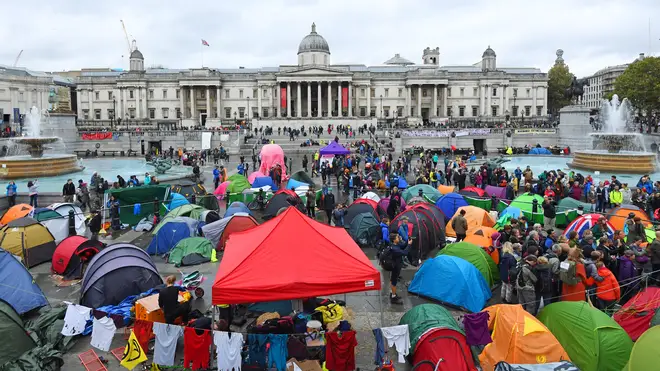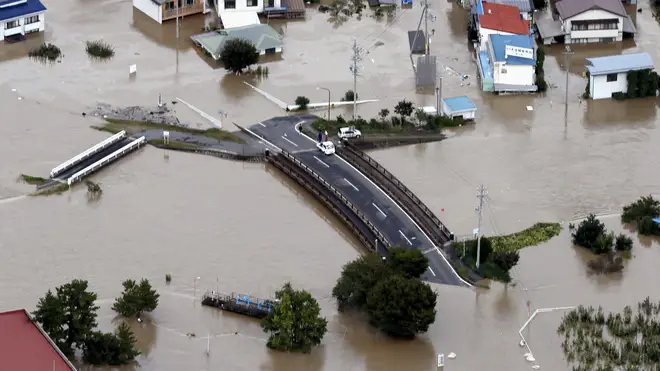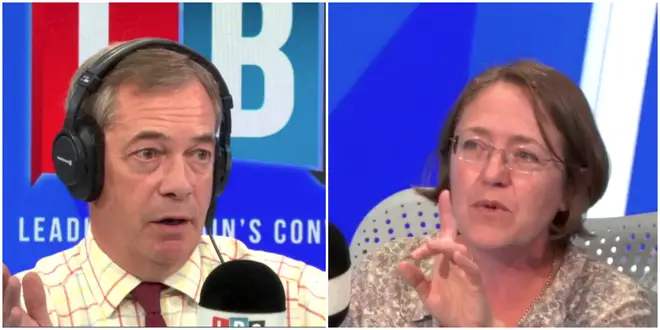
Rachel Johnson 7pm - 10pm
13 October 2019, 16:31
In a wide-ranging chat, Extinction Rebellion's Sarah Lunnon and Nigel Farage discussed the organisation's aims, methods and a controversial Citizen's Assembly proposal.
Nigel started off the conversation by asking how funded it.
Sarah said that it is "crowdsourced" and is "funded from a huge host of individual donors".
He then asked if it's true that some protesters are being paid to do this.
Sarah explained: "The vast majority received no payment whatsoever. Some people are paid living expenses for Extinction Rebellion because they are committed full-time to working for Extinction Rebellion.
And interestingly, in terms of enabling a whole swathe of society to come work for us, we're not saying you have to do this for free, we're saying wherever you come form within society, whether you're privileged, whether you're working class, if you're committed to Extinction Rebellion, you can come and work for us and we will cover your costs so that you can do it."
Nigel Farage then asked about how upset it has made some people in central London, such as taxi drivers.

Lunnon said: "The whole philosophy of Extinction Rebellion is to disrupt, that's what we set out to do. There's no easy way of saying that. Every time I say that, I sit in studios and I say to someone, I am setting out to disrupt your every day life. I feel very, very uncomfortable about it.
It's accepting that there's been a lack of action over thirty years from our governments that has meant that we have had to take this action to raise these issues. If we stand on the streets and hand out leaflets, nobody takes any notice of us. Politicians don't take any notice of us and, interestingly, Nigel, the only reason i'm on this programme today is because we've camped out on the streets of London for the last week."
Nigel said: "I had a point of view that was very, very polar opposite to where political debate in Britain was and so what did I do, well I went out and campaigned around the country, helped form political parties, gained elective representation and managed to succeed... I don't think I've ever broken the law in doing what I'm doing."
He used this to ask about why they seek "anarchy" instead of following a peaceful political process.
Sarah Lunnon admitted that they hadn't used political mechanisms as effectively as Nigel Farage raised the issue of Europe.
Nigel Farage suggested their problem might be that their claims are "frankly hysterical" and that saying "there is the possibility of billions dying is just not credible".
She responded by referencing the typhoon in Japan and mentioning how the weather is "becoming more extreme".

Farage called the extreme weather story" "utter nonsense".
He asked Sarah to justify this. She reference The Bahamas and other extreme weather events in recent years.
Nigel Farage asked what Extinction Rebellion actually want the government to do.
He said: "Government here has already made a commitment which I think is impossible to keep of saying that by 2050 we'll zero net neutral on carbon but you want this to happen by 2025. To do that, we would effectively have to close down all of British industry, wouldn't we?
She replied: "We would have to totally refocus British industry. It would be a mobilisation like we did in 1939."
Nigel said: "It's the opposite, isn't it? In 1939, we built factories to produce munitions for war."
Sarah said: "Actually, we refocused our factories is what we did. We took the infrastructure that was in place and we refocused it towards the war effort. What we also did, we rationed what was available and brought the country together. We unified the country and we mobilised to fight a common enemy. Unfortunately, the enemy that we're looking at, at the moment, we can't see it but it is there and that's why we're calling for zero carbon by 2025. To defend and protect."
Nigel replied: "So steel would go, chemical production would go, refining would go - what would we have left?"
Sarah said: "The choices that we're looking at are really, really grim. So that's why Extinction Rebellion is looking for a Citizen's Assembly, so the people come together to decide how and what the change is required looks like. Rather than politicians, sitting in Westminster, and saying to us you have to do that, you need to do that."
Nigel questioned her about 'citizens assemblies'. He wanted to know who was involved.

She said it was a "cross-section of people" and elaborated on that.
Nigel asked: "So an appointed citizens assembly would tell government what to do?"
Sarah repsonded: "They would lead an advised government."
Nigel told her he was "very sceptical about that".
Sarah then offered an invite to see a citizens assembly and to meet with climate scientists.
She repeatedly invited Nigel who said he'd spoken to scientists on both sides of the argument.
Sarah questioned whether there are many scientists on both side of the argument.
Nigel then asked why they didn't become part of a plan to reforest the country and asked "where are the positives".
She argued that asking people to plant trees is "commensurate with the risk we are saying you are facing".
Nigel finished the conversation by saying that the idea of a citizens assembly "worries" him the most.
You can watch the full interview at the top of this article.